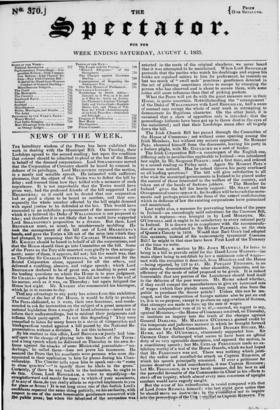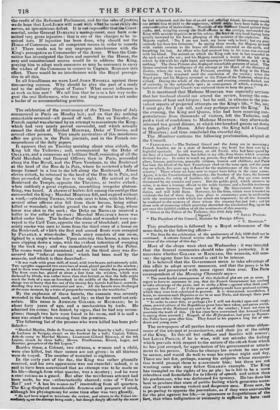NEWS OF THE WEEK.
THE hereditary wisdom of the Peers has been exhibited this week in dealing with the Municipal Bill. On Tuesday, their
Lordships agreed to the second readine. ; but upon the condition that counsel should be admitted to plead at the bar of the House in behalf of the doomed corporations. Lord STRANGFORD moved that the Corporation of Coventry should be heard by counsel in defence of its privileges. Lord MELBOURNE opposed the motion, in a manly and sensible speech. He intimated with sufficient plainness, that the object of the Tories was to defeat the bill by delay ; and warned them how they trifled with a measure of such importance. It is not improbable that the Tories would have given way, had the professed friends of the bill supported Lord MELBOURNE; • as it could not be denied that one corporation had as good a claim to be heard as another, and that con-
sequently the whole number affected by the bill might demand with equal justice to be defended at the bar. This would have amounted to an indefinite postponement of the measure—a step which it is believed the Duke of WELLINGTON is not prepared to take; and therefore it is not likely that he would have supported Lord Slassioroen's proposition to a division. But then, Lord BROUGHAM must, as usual, be mischievously meddling He took the management of the bill out of Lord MELBOURNE'S bands, and gave the Tories a lift out of the mire into which they bad plunged; by proposing that Sir CHARLES WETHERELL and Mr. KNIGHT should be heard in behalf of all the corporations, and that the House should then go into Committee on the bill. Some of the Peers on the Tory side assented very gladly to this arrange- ment; some of them, it appears, did not; but the result was, that on Thursday Sir CHARLES WETHERELL, who is retained for the Bristol Corporation alone, appeared for all the others, and delivered a rambling, abusive, and vulgar speech ; which Lord BROUGHAM declared to be of great use, as tending to point out the leading questions on which the House is to pass judgment. Sir CHARLES spoke for four hours, but did not come to the end of his matter, such as it was, on Thursday; but again fatigued the House last night. Mr. KNIGHT also commenced his harangue, which be is to resume to-day. That any advantage to any party has arisen from this exhibition of counsel at the bar of the House, it would be folly to pretend. The Peers abdicated, as it were, their own functions, and conde- scended to ask for instruction on the subject of a great measure of national legislation from a couple of hired advocates—hired not to inform their understandings, but to mislead their judgments and inflame their party-spirit. Is not this. degrading ? They were compelled to listen for many hours to a strain of vituperation and blackguardism vented against a bill passed by the National Re- presentatives without a division. Is not this indecent? By his conduct in this affair, Lord BROUGHAM justly laid him- self open to the charge of playing into the hands of the Tories: and a long speech which lie delivered on Thursday in his own de- fence against the attacks of some Ministerial journalists—" un- derlings," he called them—does not prove his innocence. He assured the Peers that his assailants were persons who were dis- appointed in their application to him for places during his Chan- cellorship. The Courier-calls upon him to speak out—to "come to close quarters"—" to Specify those lie libels in the gross." Certainly, if there be any truth in the insinuation, he ought to do this. Come, Lord BROUGHAM, a truce to mystifying—be straightforward and manly for once: to which of your assailants, if to any of thein,do you really allude as rejected applicants to you for place or favour ? It is not long since one of this foolish Lord's confidants repeated the same thing publicly, on hisauthority, with respect to one of the most honourable gentlemen connected with the public press; but when the falsehood of the accusation was
retorted in the teeth of the original slanderer, we never heard that it was attempted to be maintained. When Lord BROUGHAM pretends that the parties who watch his doublings and expose his tricks are repulsed suitors to him for preferment, lie reminds us but too much of " swell mob " practices: gentlemen detected in the act of pilfering sometimes strive to escape by charging the person who has observed and is about to secure them, with some crime still more infamous than that of picking pockets.
What the Peers will yet do with the great measure now in their House, is quite uncertain. Notwithstanding the " arrangement" of the Duke of WELLINGTON with Lord BROUGHAM, half a score of counsel may occupy the whole of next week in attempting to demonstrate its flagitious character. On the other hand, it is surmised that a show of opposition only is intended: that the proceedings hitherto have been got up to throw dust in the eyes of the uninitiated; and that their Lordships mean after all to gulp down the bill.
The Irish Church Bill has passed through the Committee of the House of Commons ; not without same sparring among the Irish Members, but without any serious opposition. Sir ROBERT PEEL absented himself from the discussion, leaving his party in a forlorn plight, with Mr. GOULBURN as a sort of leader. The Irish Corporation Bill—a counterpart of the English one, differing only in peculiarities applicable to Ireland—was introduced last night, by Mr. Sergeant PERRIN ; read a first time, and ordered to a second reading on Friday next. Again Sir ROBERT PEEL'S absence was noticed. Has he indeed thrown his party overboard on all leading questions? The bill will give satisfaction to all who wish the municipal governments in Ireland to be placed under the control of those interested in the welfare of the country, and taken out of the hands of factious jobbers. " The Member for Ireland" gives the bill his hearty support: Mr. SHAW and the Orangemen of course oppose it; for its effect will be to curb the move- ments and perhaps prostrate the force of the armed confederation which in defiance of law the existing corporations have patronized and maintained.
Last night also, a measure for preventing breaches of the peace in Ireland—an exceedingly mild substitute for the Coercion Bill, which it replaces—was brought in by Lord MORPETH. Mr. O'CONNELL said it ought to be satisfactory to every rational party in Ireland. It is drawn up in compliance with the recommenda- tion of a report, attributed to Sir HENRY PARNELL, on the state of Queen's County in 1830. Would that Earl GREY had adopted this measure, instead of his unnecessarily tyrannical Coercion Bill I he might in that case have been First Lord of the Treasury at the time we write.
On Monday, a motion by Mr. JOHN MAXWELL for leave to bring in a bill to provide relief for the Hand-Loom Weavers—the main object being to establish by law a minimum rate of wages— met with the reception it deserved, from Ministers and the House —being rejected, by 129 to 41. Mr. PouLerr Triomsosr, in an able speech, demonstrated the utter absurdity, injustice, and in- efficiency of the mode of relief proposed to be given. It is indeed lamentable that any portion of the Legislature should lend itself to the delusion of the poor weavers. Mr. HUME asked whether, if' they could compel the manufacturers to give an increased rote of wages (which they plainly cannot), they could also force the public to purchase the dearer article ? Unless this can be ma- naged, and the competition of foreign nations also be put an end to, it is to no purpose, except to produce an aggravation of distress, that attempts are made to force up the rate of wages.
By an independent vote of 55 to 47,—carried, we regret to say, against Ministers,—the House of Commons resolved, on Thursday, to institute an inquiry into the truth of the charges against General DARLING. Mr. MAURICE O'CONNELL gained credit by the temperate and judicious manner in which he brought forward his motion for a Select Committee. Lord DUDLEY STUART, Mr. Hume, and Mr. O'CONNELL, strenuously supported him. Sir GEORGE GREY discharged what seems to have been an efficiai duty of no very agreeable description, and opposed the motion, in a conciliatory speech ; but Mr. CUTL AR FERGUSSON made an ex- hibition worthy of a tool of the Horse Guards, which we bad hoped that Mr. FERGUSSON was not. There was nothing which justi- fied the unfair and uncalled-for attack on Captain ROBISON, of which his speech principally consisted. If ever a petitioner for justice deserved a kind consideration, it was Captain ROBISON; but Mr. FERGUSSON, in a very harsh manner, did his best to aid the powerful favourite of the Commander-in-Chief in his efforts to stave off an inquiry, which almost every man conscious of upright conduct would have eagerly sought. But the error of his subordinates is venial compared with that of Lord JOHN RUSSELL himself; who last night gave notice that he 'should move an instrurtio.i tp the l'otrrniitfee not to inquire into the proccedinfs of the Coll t-insitial on Captain 40,/.31s.P.N• f9.c the credit of the Reformed Parliament, and for the sake of justice,. we do hope that Lord JOWN will meet with whet he most richly der, serves, an ignominious defeat. It is not impossible that the Court- martial, under General DARLING'S management, may hare com- mitted %cry gross injustice : that is one of the charges to be in- quired into. If injustice has been done, why should not the House of Commons use all competant means in order to remedy it ? There needs not be any improper interference with the King's prerogative as Commander of the Army. When the Com- mittee has investigated the facts and reported to the House, the easy and constitutional course would be to address the King, praying him to adopt such measures as may be necessary to carry the wishes of the Commons in respect to Captain ROBISON into effect. There would be no interference with the Royal preroga- tive in all this.
In all friendliness we warn Lord JOHN RUSSELL against these timeserving courses. Why should lie play the part of a ready- tool to the military clique of Tories? What secret influence is at work on him now ? We tell him that lie is in a fair way to dis- gust the real Reformers, who may not long consent to act under a leader of so accommodating practice.



























